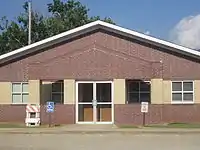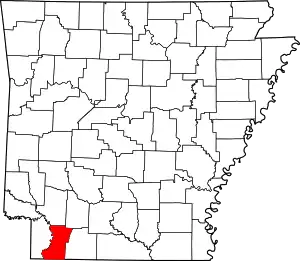Bradley, Arkansas | |
|---|---|
 Bradley City Hall | |
 Location in Lafayette County, Arkansas | |
| Coordinates: 33°5′55″N 93°39′27″W / 33.09861°N 93.65750°W | |
| Country | United States |
| State | Arkansas |
| County | Lafayette |
| Government | |
| • Mayor | Jason Martin[1] |
| Area | |
| • Total | 0.91 sq mi (2.36 km2) |
| • Land | 0.91 sq mi (2.36 km2) |
| • Water | 0.00 sq mi (0.00 km2) |
| Elevation | 253 ft (77 m) |
| Population (2020) | |
| • Total | 405 |
| • Density | 443.59/sq mi (171.30/km2) |
| Time zone | UTC−06:00 (Central (CST)) |
| • Summer (DST) | UTC−05:00 (CDT) |
| ZIP Code | 71826 |
| Area code | 870 |
| FIPS code | 05-08290 |
| GNIS feature ID | 0076408 |

Bradley is a city in Lafayette County, Arkansas, United States. The population was 628 at the 2010 census.[3]
Geography
Bradley is located in southern Lafayette County at 33°5′55″N 93°39′27″W / 33.09861°N 93.65750°W (33.098580, -93.657434).[4] It sits at the intersection of Arkansas Highways 29 and 160. Highway 29 leads north 19 miles (31 km) to Lewisville and south 6 miles (10 km) to the Louisiana border at Arkana. Plain Dealing, Louisiana, is 14 miles (23 km) south of Bradley. Highway 160 leads east from Bradley 7 miles (11 km) to the community of State Line and west 15 miles (24 km) to Interstate 49 near Doddridge.
According to the United States Census Bureau, Bradley has a total area of 0.93 square miles (2.4 km2), all land.[3]
Demographics
| Census | Pop. | Note | %± |
|---|---|---|---|
| 1910 | 123 | — | |
| 1920 | 290 | 135.8% | |
| 1930 | 363 | 25.2% | |
| 1940 | 409 | 12.7% | |
| 1950 | 444 | 8.6% | |
| 1960 | 712 | 60.4% | |
| 1970 | 706 | −0.8% | |
| 1980 | 790 | 11.9% | |
| 1990 | 585 | −25.9% | |
| 2000 | 563 | −3.8% | |
| 2010 | 628 | 11.5% | |
| 2020 | 405 | −35.5% | |
| U.S. Decennial Census[5] | |||
2020 Census
| Race / Ethnicity | Pop 2000[6] | Pop 2010[7] | Pop 2020[8] | % 2000 | % 2010 | % 2020 |
|---|---|---|---|---|---|---|
| White alone (NH) | 261 | 263 | 165 | 46.36% | 41.88% | 40.74% |
| Black or African American alone (NH) | 291 | 353 | 222 | 51.69% | 56.21% | 54.81% |
| Native American or Alaska Native alone (NH) | 0 | 1 | 0 | 0.00% | 0.16% | 0.00% |
| Asian alone (NH) | 2 | 1 | 1 | 0.36% | 0.16% | 0.25% |
| Pacific Islander alone (NH) | 0 | 0 | 0 | 0.00% | 0.00% | 0.00% |
| Some Other Race alone (NH) | 0 | 0 | 0 | 0.00% | 0.00% | 0.00% |
| Mixed Race/Multi-Racial (NH) | 5 | 1 | 8 | 0.89% | 0.16% | 1.98% |
| Hispanic or Latino (any race) | 4 | 9 | 9 | 0.71% | 1.43% | 2.22% |
| Total | 563 | 628 | 405 | 100.00% | 100.00% | 100.00% |
As of the census[9] of 2000, there were 563 people, 223 households, and 134 families residing in the city. The population density was 614.8 inhabitants per square mile (237.4/km2). There were 285 housing units at an average density of 311.2 per square mile (120.2/km2). The racial makeup of the city was 46.36% White, 52.40% Black or African American, 0.36% Asian, and 0.89% from two or more races. 0.71% of the population were Hispanic or Latino of any race.
There were 223 households, out of which 30.0% had children under the age of 18 living with them, 32.7% were married couples living together, 22.4% had a female householder with no husband present, and 39.9% were non-families. 37.2% of all households were made up of individuals, and 20.6% had someone living alone who was 65 years of age or older. The average household size was 2.52 and the average family size was 3.38.
In the city, the population was spread out, with 33.6% under the age of 18, 9.6% from 18 to 24, 23.1% from 25 to 44, 17.9% from 45 to 64, and 15.8% who were 65 years of age or older. The median age was 31 years. For every 100 females, there were 80.4 males. For every 100 females age 18 and over, there were 70.8 males.
The median income for a household in the city was $14,375, and the median income for a family was $19,306. Males had a median income of $21,719 versus $14,688 for females. The per capita income for the city was $2,455. About 43.9% of families and 49.6% of the population were below the poverty line, including 66.5% of those under age 18 and 42.2% of those age 65 or over.
Education
Public education for elementary and secondary students is provided by the Emerson-Taylor-Bradley School District, which includes Bradley Elementary School and Bradley High School. The school's mascot and athletic emblem is the Bear, with purple and gold serving as the school colors.
The former Bradley School District consolidated into the Emerson-Taylor district effective July 1, 2013.[10]
Infrastructure
Highways
References
- ↑ KSLA Staff. "Bradley, Ark. appoints new mayor". Raycom Media. Retrieved September 12, 2016.
- ↑ "2020 U.S. Gazetteer Files". United States Census Bureau. Retrieved October 29, 2021.
- 1 2 "Geographic Identifiers: 2010 Census Summary File 1 (G001), Bradley city, Arkansas". American FactFinder. U.S. Census Bureau. Archived from the original on February 13, 2020. Retrieved August 20, 2019.
- ↑ "US Gazetteer files: 2010, 2000, and 1990". United States Census Bureau. February 12, 2011. Retrieved April 23, 2011.
- ↑ "Census of Population and Housing". Census.gov. Retrieved June 4, 2015.
- ↑ "P004 HISPANIC OR LATINO, AND NOT HISPANIC OR LATINO BY RACE – 2000: DEC Summary File 1 – Bradley city, Arkansas". United States Census Bureau.
- ↑ "P2 HISPANIC OR LATINO, AND NOT HISPANIC OR LATINO BY RACE – 2010: DEC Redistricting Data (PL 94-171) – Bradley city, Arkansas". United States Census Bureau.
- ↑ "P2 HISPANIC OR LATINO, AND NOT HISPANIC OR LATINO BY RACE - 2020: DEC Redistricting Data (PL 94-171) – Bradley city, Arkansas". United States Census Bureau.
- ↑ "U.S. Census website". United States Census Bureau. Retrieved January 31, 2008.
- ↑ "State approves Bradley school annexation by Emerson-Taylor district". Magnolia Reporter. May 14, 2013. Retrieved October 19, 2017.
External links
- "Bradley (Lafayette County)" at The Encyclopedia of Arkansas
- Community blog (last updated 2012)
